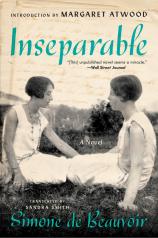Inseparable
Review
Inseparable
Simone de Beauvoir was born in Paris and stayed there for most of her life. The Existentialist philosopher, novelist, essayist, editor and groundbreaking feminist is known perhaps most importantly as the author of THE SECOND SEX. While maintaining a relationship with the bullish philosopher king Jean-Paul Sartre, she published several autobiographical works, as well as highly acclaimed novels (including THE MANDARINS, winner of the Prix Goncourt).
Sartre told de Beauvoir that INSEPARABLE was not good enough to publish while she was alive. However, her daughter felt differently. Although de Beauvoir no longer graces this planet, we all have a chance to read this passionate and beautiful novel, which has been translated by Sandra Smith. De Beauvoir has produced a coming-of-age story that presents the wonders of young female friendship in all its ferocity, with the gentle voice of someone who has experienced it firsthand. It would have been a worthy precursor to Elena Ferrante’s Neapolitan Quartet.
De Beauvoir was a free-thinking woman who was never prone to swooning. As such, however closely the elements of this tale reflect her own experience, INSEPARABLE is no moony, girls’-first-love, are-they-or-aren’t-they salacious teen drama. Instead, it is a steady gaze at a time in one’s life when friendship begins to take the place of deep family bonds. The book doesn’t shirk from the intensity of feelings that our protagonist Sylvie has for her dear friend, Andrée.
"[T]his beautifully translated work marks a new starting point for de Beauvoir’s illustrious career. For this, especially, INSEPARABLE is a literary treasure for the ages."
Andrée is relentlessly reckless and seeks all types of dangerous adventures that Sylvie, who is more wistful and romantic, is terrified of experiencing. She is more interested in discussing deep topics, investigating religious hypocrisy and the myriad of ways in which post-WWI France must change. Andrée wants drama and romance and vows to fight fears by facing them directly. As the girls grow older, their differences encourage them to play out opposite experiences of burgeoning womanhood.
De Beauvoir had a good friend, Zaza Lacoin, on whom Andrée is based. Their real-life friendship was transformative as well as tragic. Clearly she is using those memories to capture the spirit of young women, leaning into rebellion of thought and deed and questioning the societal restraints that are holding their role models back from lives of excitement and learning. The prose here is strong and direct, and Sylvie takes steps to avoid the fateful mistakes that Andrée storms into throughout their time together.
Readers don’t have to wait long for something to happen. There is a gentle but insistent pull in the story that moves the characters slowly but surely toward their fates. Their intentions and innermost feelings are expressed more in the questioning of Sylvie than in the restrained but chaotic thoughts of Andrée. It might be hard for a young audience to see themselves in these characters; they are very much rebelling against the restrictions of a bygone era. When Sylvie has trouble with her inner thoughts, she considers her Catholic priest’s advice, which is to be quiet and well-behaved. Andrée is quite the opposite, and the headmistress at the girls’ school both reprimands and celebrates her naughtiness. However, the general notion of young ladies worrying about how they can avoid the pitfalls of the previous generation is one that today’s women can relate to without issue. It is the story of all young generations.
There is no doubt that de Beauvoir was fictionalizing the inner struggle she felt as a human being, the breaking free of conventions being at the forefront of her mind. However, the religious influence on her protagonist clearly is her attempt to reconcile her own religious upbringing with the less conventional behaviors she would adopt as an adult. Her bravery is on the gentle cycle here, as the fervent calls for freedom that would mark her later work exist in the seeds set forth in this book. She felt that the story was too close to the vest for her to release during her lifetime.
In any case, this beautifully translated work marks a new starting point for de Beauvoir’s illustrious career. For this, especially, INSEPARABLE is a literary treasure for the ages.
Reviewed by Jana Siciliano on September 17, 2021
Inseparable
- Publication Date: September 13, 2022
- Genres: Fiction
- Paperback: 176 pages
- Publisher: Ecco
- ISBN-10: 0063075059
- ISBN-13: 9780063075054



